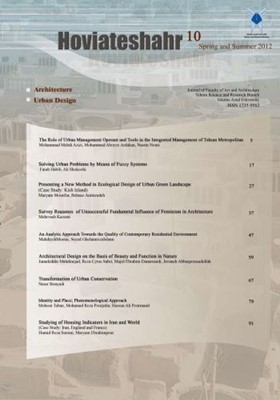Solving Urban Problems by Means of Fuzzy Systems
Subject Areas : architecturefarah habib 1 , Dr Ali Shokoohi 2
1 - Assistant Professor Department of Art and Architecture, Science and Research Branch
2 - Islamic Azad University, Zanjan Branch, Research Affairs Manager
Keywords:
Abstract :
The study of complex systems is bringing new vitality to many areas of science where a more typical reductionism strategy has fallen short. Complexity expresses a condition of numerous elements in a system and numerous forms of relationships among the elements. In this regard, urban systems are complex and finding their elements and relationships is a wicked problem. The search for scientific bases for confronting these problems is bound to fail, because of their aggressive nature. The kinds of problems that urban planners deal with, societal problems are inherently different from the problems that scientists and perhaps some classes of engineers deal with. Planning problems are inherently wicked. As distinguished from problems in the natural sciences, which are definable and separable and may have solutions that are findable, the problems of urban planning are ill-defined; and they rely upon elusive political judgment for resolution. But nowadays, scientists are seeking non-linear coupling rules for resolute complex systems problems. In these endeavors, fuzzy systems are an alternative to traditional notions of logic that can cope with complexity of systems. Fuzzy systems provide a rich and meaningful addition to standard logic. Utilizing fuzzy systems in an urban environment raises the likelihood of encountering difficult stability problems. This paper aims to follow the بررسی امکان بکارگیری نظریه فازی در تحلیل مسائل پیچیده شهرapplication of fuzzy systems in the analysis of urban complex problems; In the first part of the paper, authors review definition of urban problem with system approach.مسأله، مانعی است که دستیابی به اهداف دلخواه را با دشواری مواجه میسازد. A problem is an issue or obstacle which makes it difficult to achieve a desired goal or purpose. It refers to a situation or issue that is yet unresolved. In a broad sense, a problem exists when an individual becomes aware of a significant difference between what actually is and what is desired. In urban studies an urban problem is difference between an observed condition and a desired condition in a city. Thus urban planning is identifying the actions that might effectively narrow the gap between what-is and what-ought-to-be in a city. (حبیب a 1383)….. For eliminate or reduce the distance between the existing and desired conditions, it is necessary to recognize of complex system constructive elements and the interrelationships between them. برای حذف یا کاهش فاصله میان وضع موجود و وضع مطلوب لازم است که عوامل و عناصر سازنده سیستم پیچیده شهر و روابط میان آنها مورد شناسایی قرار گیرد. بنابراین مسأله شهری، در واقع یافتن اجزا و عناصر سازنده یک پدیده شهری و نحوه پیوند و عملکرد آنهاست. Therefore, urban problem, is finding elements of the urban system and relationships between them. This study is concerned with proposing of a fuzzy system driven approach for solving urban problems and introduces a new model for solving urban problems with fuzzy systems principles. In this model, expert knowledge of urban field converts to fuzzy "If-Then" rules at the first. Then a Fuzzy Urban Decision Engine (FUDE) that connected to a rules database, return a fuzzy solution for a wicked problem. The findings indicate that the fuzzy system methods are powerful processes and analytic tools for helping planners to resolve urban complex problems. These tools can be successful where as others have failed because both incorporate or address uncertainty and risk; complexity; systems interacting with other systems; competing points of view and values; different people knowing different parts of the urban problem; and inter organizational politics.
_||_


